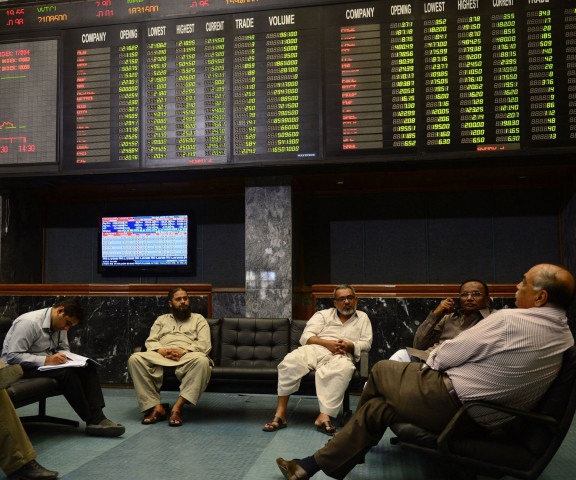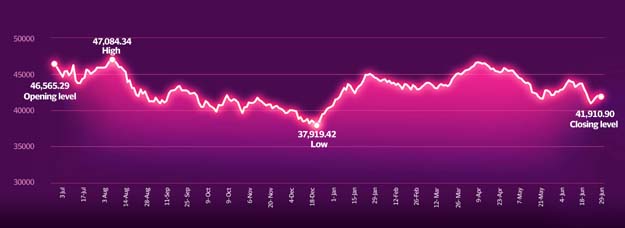Amid upheaval, Rs857b wiped off Pakistan’s stock market
KSE-100 endures worst year since 2008-09 with change in political leadership

Representational image of Pakistan Stock Exchange lounge. PHOTO: AFP
As Pakistan battled the change in leadership, the economy suffered, uncertainty prevailed and short-term measures were taken to address long-standing issues.
The stock market may not necessarily reflect performance of an economy as a whole, but does convey market sentiment; whether the outlook is positive or are there bumps on the road ahead.
In Pakistan’s case, the last 12 months were a tough ride for stock market participants who saw the country move towards a balance of payments crisis, higher inflation and interest rates as well as lower earnings of listed companies.
As a result, savings took a hit, investments were squeezed, and wealth was significantly reduced. In a nutshell, over Rs857 billion was wiped off Pakistan’s stock market in what was the worst year for the KSE-100 Index since the disastrous 2008-09 period when the global financial crisis hit.
After eight years of posting positive returns, the KSE-100 - a benchmark for market performance - ended with a 10% loss over the course of 12 months starting July 2017. The index fell from 46,565 to 41,911 during the year, but it doesn’t convey the story.
Additionally, a 10% retreat may only qualify as a correction, but in dollar terms an investor lost close to 22% on average since the rupee weakened, shrinking the amount even more.

It makes Pakistan one of the worst performing markets in the world in FY18 with third consecutive year of foreign outflow, wrote Topline Securities in a year-ender note on the KSE-100.
“We attribute this below-par performance to increased political noise amid upcoming general elections, deterioration in the external account and continued foreign selling,” stated the brokerage house.
Foreigners were net sellers of $286 million, a lower number compared with FY17, but with the emerging market status, it surprised market followers especially when the expected inflow did not meet expectations.
Not one mutual fund posted a positive return with fiscal-year losses going as high as 24%. With such earnings, fund managers endured one of the toughest years since FY09. Even brokerage houses, which rely mostly on commission, saw their income squeeze as average traded volume plunged by 50% year-on-year to 175 million shares.
Cement, banks, oil and automobiles were among the worst-hit, and each had its own reason. But overall, what the stock market endured was a result of poor decisions, lack of political will to bring about meaningful change, and inconsistent policy ahead of the general elections. Add the change in leadership more times than expected and you have all the ingredients of a bearish run.
On the economic front, the rupee, the previous government’s long-standing symbol of strength and power, lost value due to falling foreign exchange reserves that remained under pressure due to mounting debt payment obligations and heavy imports.
Foreign shipments may have made their way into the country due to the China-Pakistan Economic Corridor (CPEC), and it may result in higher growth down the road, but the price is being paid by Pakistan at the moment.
In such a scenario, when individuals are uncertain and macroeconomic indicators fail to improve, the economy usually goes through a stagnation phase. This is the reason why most international agencies forecast a lower GDP growth for Pakistan next year.
Tax amnesty scheme
The previous government also pinned hope on the tax amnesty scheme, the single largest measure to attract inflows into the country and increase tax revenue, but with trust deficit and corruption - the major reasons why money flew out in the first place - at the same level, there is little reason to believe that it would change fate drastically.
Additionally, even if there is a one-time inflow of money, it may prove to be a short-lived reprieve with the import bill, debt repayments remaining Pakistan’s kryptonite.
Road ahead
Clarity may prevail after the general elections are held towards the end of the month, but a hung parliament with no clear majority may stall economic decision-making.
What Pakistan needs right now is a clear roadmap with decision-making being consistent and tough. If the power sector needs revamping, tough decisions will need to be made including significant crackdowns. If tax revenue is to be increased, then the Federal Board of Revenue (FBR) and provincial arms will have to adopt strictness and fairness.
The country’s security situation may have improved since 2013, but underlying issues have remained the same.
Published in The Express Tribune, July 1st, 2018.
Like Business on Facebook, follow @TribuneBiz on Twitter to stay informed and join in the conversation.


















COMMENTS
Comments are moderated and generally will be posted if they are on-topic and not abusive.
For more information, please see our Comments FAQ